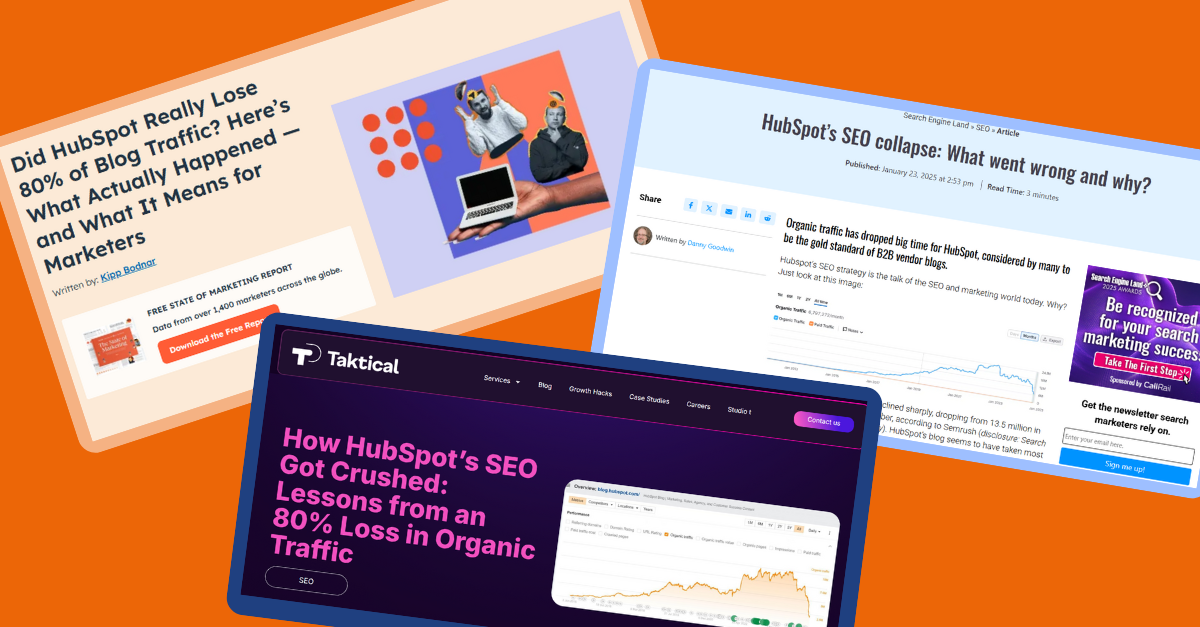How Bitesize Bio’s Organic Traffic Has Survived in the Age of Generative Search Optimization (GEO)
When AI-powered search shook the marketing world and slashed traffic for giants like HubSpot, many sites scrambled to survive. Yet Bitesize Bio’s traffic barely flinched, even as competitors took heavy hits. In this article, we unpack the two core principles that kept us “AI-proof,” why they work for both humans and algorithms, and the practical steps you can take to make your own content thrive in the age of generative engine optimisation.
You might have heard that HubSpot lost 80% of its blog traffic this year
Search Engine Land covered it. HubSpot responded. Media companies everywhere started panicking about the rise of LLMs and generative search engines.
Meanwhile, at Bitesize Bio, something interesting happened…
Nothing.
In fact, our organic keyword ranking actually increased.
But when we looked at our competitors on Semrush, we noticed they weren’t so lucky. Many saw significant drops in organic search traffic.
So what made the difference?
The two things protecting Bitesize Bio’s traffic
First, our content comes from real lived experience that can’t be replicated by AI or found in textbooks. We’re not interested in sharing stuff you can access elsewhere. We want the lab wisdom you can’t learn from a book: the hack that finally made your experiment work on the 13th try, the troubleshooting trick that nobody talks about.
That knowledge only comes from lived experience in the lab. AI can’t manufacture it.
Second, we’ve always talked to you like a friend, not like a stuffy professor writing a report. We use conversational language because we’re genuinely trying to help, not show off how smart we are.
Turns out, LLMs do the same thing. They try to talk to people at their level using a conversational tone. And apparently, they quote Bitesize Bio quite a lot.
The lesson? The same strategy that works for humans works for robots, too
Google’s algorithm isn’t your enemy, trying to trip you up. It’s trying to surface the most useful content for actual people. So if your content works for humans, it’ll work for Google’s robots because that’s what they’re optimizing for.
Here’s the thing most people miss: optimizing terrible content is like rearranging deck chairs on the Titanic. If you don’t have something unique to say, if you’re not offering a genuine perspective that actually helps people, no amount of SEO wizardry will save you.
Ask yourself, “Is this a unique insight? Does it come from a real human perspective? Is it actually relevant to my audience?”
If the answer’s no, don’t publish it.
How to Build “AI-Proof” Content Today
For sponsors and life science marketers, the takeaway is clear: content rooted in real expertise and authenticity wins, no matter how search evolves. Here are tactical moves you can make now:
- Mine Real Human Insights
Ask your audience directly what problems they are struggling with. Create content that answers those questions with stories, examples, and personal wisdom, not just summaries of existing literature. - Prioritize Depth Over Breadth
Follow HubSpot’s advice post-crisis: focus on deep, differentiated expertise. One standout article packed with unique insights beats 10 generic listicles every time. - Use Conversational, Accessible Language
Cut the jargon. Write like you’re explaining it to a colleague over coffee. LLMs favor this tone, and so do readers. - Diversify Beyond Organic Search
Don’t put all your marketing eggs in Google’s basket. Invest in newsletters, webinars, and gated content communities. HubSpot smartly bought The Hustle newsletter for this very reason. - Build a Recognizable Brand
In the age of LLMs, brand recognition is everything. When your name pops up in an AI-generated answer, you want instant credibility, a.k.a., the “Coca-Cola effect” of trust.
Are you a life science marketer looking for more content and community marketing insights? Subscribe to The Growth Factor and discover proven strategies for promoting your products and services. Sign up here.
